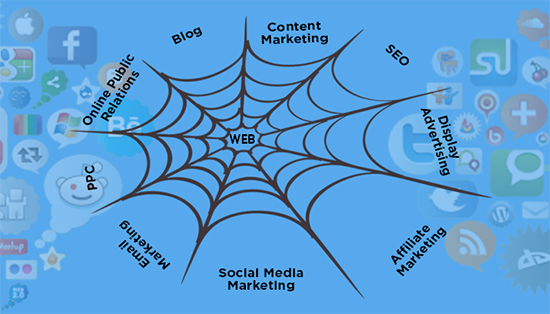The Role of a Website in Digital Media Marketing
https://admateacademy.blogspot.com/2017/02/the-role-of-website-in-digital-media.html
 |
| © March Oyinki 2017 |
Many of the online marketing and advertising channels, particularly social media and blogs, are beginning to integrate storefronts and e-commerce capabilities, while trying to provide pages that serve as home for individuals and small business owners. That however, does not make those pages a website, because they do not have the same dynamics and first level domain characteristics of a website.
A great number of the digital media marketing campaigns, whether it is content marketing, email marketing, Pay-Per-Click, Social media, affiliate marketing, blog; search engine optimization, display advertising or online public relations, are most often targeted at driving traffic to a website.
What Makes a Good Website?
First and foremost, what exactly is a website? A website is simply a collection of web pages that promote your brand. A good website is one that is simple, clean, fast, navigable, interactive and provide a platform for visitors to easily transact business.

A good website must be simple: A website can be termed as being simple and clean when it contains pages that have vivid information with relevant details about a product usually within the first screen view, and one that does not have distracting flashing objects, scrolling marques or a barrage of colourful images. A good website is not one that has the most fanciful colours, screaming headings and lots of information.
Most visitors to a site do not have much time. They already may have spent time searching the net to locate your site, and they just want to browse through and see what you have to offer that can enable them take quick and informed decisions about what they need and where they can get a good offer. A website that provides concise, brief but vital details about their products in a neat and readable format, is most likely to record higher conversion rate.
A good website must be fast: A visitor to a website, most often than not, must have clicked-through a search result to get to you, and the last thing they expect is to wait even longer while your site buffers endlessly trying to open. After just a few seconds of waiting, the most likely thing a visitor to your site would do is to back out fast and return to the initial search result with a simple click of the 'back' button, and whoop! Your fancy page has just lost a potential conversion. According to HostingFacts, slow loading websites cost the U.S. e-commerce market more than $500 billion annually.
Quite a number of reasons can be attributed for a site being slow, and one of them is the size of the web page. A page with lots of images or a single large one, or contains lengthy content, could increase the size of the page and make it slow to download. The site's compatibility to a browser can also affect its download rate, and website that contains a lot of images and lengthy content is more likely to have low conversion rate, regardless of the traffic.
A good website must be navigable: Sites that have structured, systematic directions to guide visitors through, in clear and simple steps; often not more than three steps from home page to checkout, have high retention rate and better conversions. Some large websites also provide additional search algorithm to assist visitors in locating specific items within the site.
Some really horrible websites implement poor navigation guides that do not provide clear direction from 'home' to product and to checkout. Visitors to the site can spend time going back and forth trying to locate product details and spend even more time trying to find the checkout button. An average visitor would be discouraged by such delays.
A good website must be Interactive: Visitors to a website often have need to interact with the site owner to request for certain urgent information, and to meet that need, a good website should be able to provide 'live chat'. Providing a contact form on a site also helps visitors send comments to site owners. Introducing social media comments box is another way website owners are able to provide real-time interaction with customers.
Websites with these features are likely to record higher conversion rate than sites that do not make provision for such.
A good website must have a Merchant Account: A website is a digital representation of a physical office. Visitors should be able to find your products, read product information, find answers to critical questions and be able to initiate a transaction. Only e-commerce websites with merchant accounts can receive payment online.
In actual fact, a website without an e-commerce platform is un-marketable, and no matter the amount of traffic directed to the site through a well planned digital media marketing campaign, you are bound to experience disappointing conversion rate. So many digital media marketing promotions fail to yield the desired results because click-through does not convert to sales.
A website is as good as its designer, or you can equally say that a website is as good as its brand. This raises great concern, and the earlier advertising agencies and digital media communications companies begin to engage the client and web designers, with the intent of trying to eliminate these impediments, online ads campaigns will continue to miss their target and achieve dismal results.
_____________
By sharing, we gain from each others experiences; share your thoughts with us using the comment box below. You can also share this article or others, so that you connections can benefit too.




















FOLLOW US ON SOCIAL MEDIA